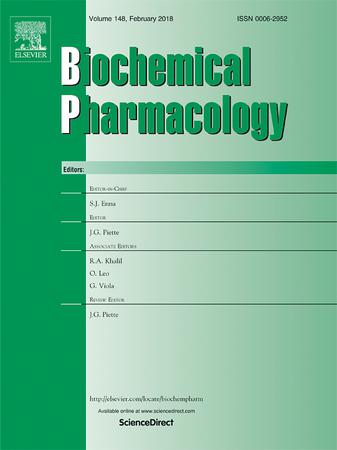Dual blockade of GSTK1 and CD47 improves macrophage-mediated phagocytosis on cancer cells
IF 5.3
2区 医学
Q1 PHARMACOLOGY & PHARMACY
引用次数: 0
Abstract
CD47 is a crucial anti-phagocytic signal in regulating macrophage responses and its manipulation offers the therapeutic potential in cancer treatment. However, in many cases, blockade of CD47 by itself is insufficient to activate macrophage effectively, indicating other unidentified phagocytosis-regulating factors to resist the macrophage activity. In this study, a genome-wide human CRISPR-Cas9 library was developed for comprehensive screening of phagocytosis-regulating factors in the context of CD47 blockade. The screening results identified GSTK1 as a potential anti-phagocytic signal counteracting the efficacy of CD47-based phagocytosis. The disruption of GSTK1 significantly increased the phagocytosis rate of cancer cells by macrophages in combination with anti-CD47 antibody. Further mechanism investigation unveiled that GSTK1 blockade increased the membrane exposure of calreticulin in different cancer cells, which might be the primary mechanism driving enhanced macrophage-mediated phagocytosis. To this end, siGSTK1-loaded nanoparticles (siGSTK1-LNPs) were designed to suppress the GSTK1 expression efficiently. The comparable phagocytosis efficacy was also observed when combining siGSTK1-LNPs with anti-CD47 antibody. Above all, GSTK1 blockade was identified as a promising and feasible stimulus for enhancing the effectiveness of anti-CD47 antibody, introducing a novel and effective combination approach in cancer immunotherapy.

求助全文
约1分钟内获得全文
求助全文
来源期刊

Biochemical pharmacology
医学-药学
CiteScore
10.30
自引率
1.70%
发文量
420
审稿时长
17 days
期刊介绍:
Biochemical Pharmacology publishes original research findings, Commentaries and review articles related to the elucidation of cellular and tissue function(s) at the biochemical and molecular levels, the modification of cellular phenotype(s) by genetic, transcriptional/translational or drug/compound-induced modifications, as well as the pharmacodynamics and pharmacokinetics of xenobiotics and drugs, the latter including both small molecules and biologics.
The journal''s target audience includes scientists engaged in the identification and study of the mechanisms of action of xenobiotics, biologics and drugs and in the drug discovery and development process.
All areas of cellular biology and cellular, tissue/organ and whole animal pharmacology fall within the scope of the journal. Drug classes covered include anti-infectives, anti-inflammatory agents, chemotherapeutics, cardiovascular, endocrinological, immunological, metabolic, neurological and psychiatric drugs, as well as research on drug metabolism and kinetics. While medicinal chemistry is a topic of complimentary interest, manuscripts in this area must contain sufficient biological data to characterize pharmacologically the compounds reported. Submissions describing work focused predominately on chemical synthesis and molecular modeling will not be considered for review.
While particular emphasis is placed on reporting the results of molecular and biochemical studies, research involving the use of tissue and animal models of human pathophysiology and toxicology is of interest to the extent that it helps define drug mechanisms of action, safety and efficacy.
 求助内容:
求助内容: 应助结果提醒方式:
应助结果提醒方式:


